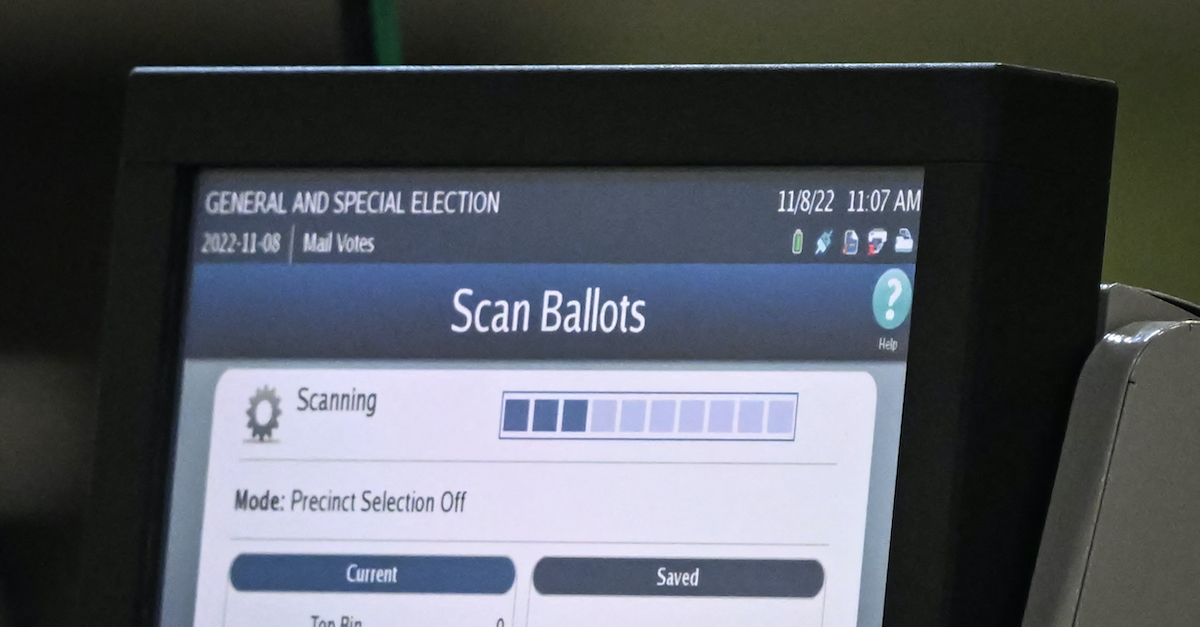
A machine counts ballots at an elections warehouse outside of Philadelphia, Penn., on Nov. 8, 2022.
Just like after the 2020 presidential election, the U.S. cybersecurity czar affirmed that there is “no evidence” any voting machine was compromised during the midterms.
“We have seen no evidence that any voting system deleted or lost votes, changed votes, or was any way compromised in any race in the country,” Jen Easterly, the director of the Cybersecurity and Infrastructure Security Agency, wrote in a statement on Wednesday.
The cybersecurity czar emphasized that the counting of the votes continues — and is likely to be for “days or weeks.”
“Right now, election officials are tabulating votes, reviewing procedures, and testing and auditing equipment as part of the rigorous post-Election Day process that goes into finalizing and certifying the results,” Easterly continued. “It’s important to remember that this thorough and deliberative process can take days or weeks, depending on state laws; these rigorous procedures are why the American people can have confidence in the security and integrity of the election. We urge everyone to look towards your state and local election officials for the most accurate and up-to-date information about vote counts and to remain patient as election officials continue to do their jobs and carry out the certification process.”
Though key races to determine control of the House and the Senate have not yet been called, the results so far have been widely interpreted as a decisive rebuke of election denialism.
Pennsylvania gubernatorial hopeful Doug Mastriano was defeated in a rout by Josh Shapiro, who will be moving from his post as the commonwealth’s attorney general to the governor’s office. A key Donald Trump ally, Mastriano helped lead the charge of Trump’s fraud claims in Pennsylvania and went to the Capitol on Jan. 6. Shapiro, by contrast, was a key figure in vanquishing attempts to overturn the election in the Keystone State.
Likewise, Michigan Gov. Gretchen Whitmer (D) held onto her seat handily, facing a challenge by Trump-endorsed Tudor Dixon (R).
In Arizona, one of the key figures in opposing attempts to subvert the 2020 election is fighting for her political life. By press time, Secretary of State Katie Hobbs (D), now vying for governor, had a tight lead over Kari Lake (R), who has refused to affirm that she will accept the results if she loses.
As The Washington Post noted, the victory for election realism was hardly unblemished. The paper counted that, as of Wednesday morning, more than 165 of 291 election deniers were projected to have won, including prominent Republicans like Florida Gov. Ron DeSantis, Sen. Rand Paul of Kentucky and Rep. Greg Pence of Indiana, the brother of former vice president Mike Pence.
Though less strident than Mastriano and Dixon in peddling false claims about the 2020 election, these candidates met the Post‘s methodology for election deniers. The paper defined that term as questioning President Joe Biden’s victory, opposing the counting of electoral votes, supporting post-election ballot reviews, signing lawsuits opposing the results, or attending “Stop the Steal” rallies.
CISA’s director expressed gratitude to election workers.
“State and local election workers have already put in long hours and will continue to do so in the days ahead to certify the election results,” Easterly said. “They serve on the front lines of our democracy, and they deserve our support, our admiration, and our respect. CISA is proud to call them partners. It’s because of them that we can all have confidence in the safety, security, and integrity of our elections.”
On Election Day, The Post also reported a wave of threats and harassment against election workers.
[Image via ED JONES/AFP via Getty Images]